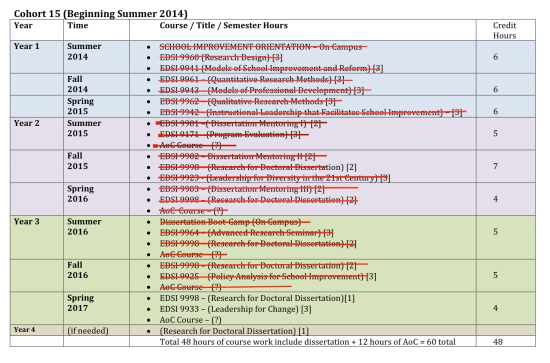Nearly 18 months ago, I started a third graduate program and about six months ago, I shared an update on this latest academic pursuit. So far, I’ve completed five semesters of coursework, a combination of research methodology, core doctoral classes and now dissertation research hours.

Coursework
The past two semesters have involved completing two courses in a three course dissertation mentoring sequence. If I understand the “typical” doctoral program correctly, the mentoring courses are fairly unique to our University of West Georgia Ed.D. program. The dissertation brainstorming and writing is scaffolded across several semesters rather than waiting until all core coursework has been completed. In Dissertation Mentoring I, the focus was understanding the dissertation process and beginning to develop ideas for our problem statements. Dissertation Mentoring II built upon the problem statements and the ended with writing a draft of chapter two, the literature review (more about that in the next paragraph). Throughout these two semesters, we’ve started to communicate with our dissertation committees including one-on-one virtual methodologist consultations. I spent the first three semesters of the program preparing myself for a study along the lines of rural central office leadership, but due to the qualitative nature of the likely research questions and my background teaching high school statistics (very quantitative), I realized (through some very wise counsel from my chair) it made more sense to pursue a topic with more quantitative questions. I’ve “settled” on a topic that will look at high school math and/or ELA grades based on standards and any correlations they might have with college readiness measures. More to come about this topic after my committee has a chance to weigh in on it.
The days starting with Thanksgiving “break” through finals week (last week) were incredibly stressful. As a person who generally needs seven hours of sleep each night, burning the candle at both ends with five hours or less of rest did not have a positive impact on my body. Thankfully, all assignments were completed on time and I was pleased overall to look back on the 26 page literature review draft. In speaking with others who have completed doctoral coursework while working full-time, I am guessing this type of schedule will rear its head in the future, too!
Cohort Camaraderie
Here’s where I give a big shout out to Bipul and Steve for the support they’ve provided during the past several semesters. Beginning in qualitative research methods, the three of us have completed a number of group projects together. I think we have a three-way text messaging thread with hundreds, perhaps thousands of messages, celebrations, fears, questions about assignments and S.O.S. pleas. I honestly don’t know how I could have survived the program so far without these two “critical friends.” Each of them has provided meaningful feedback on drafts of problem statements and literature reviews. Despite our timezone differences, it has not been uncommon for the three of us to begin texting after one person’s supper and sign off well past another person’s midnight. Through desperation phone calls and celebratory emails, Bipul and Steve have been there to experience the ups and downs of balancing graduate coursework deadlines with full-time jobs and family illnesses.
Looking ahead to the final four semesters
With a bit of perseverance, I am aiming to defend a dissertation in the spring of 2017. Working backwards, I’ve established the following timeline:
- January/February 2016: Submit draft literature review (chapter 2) for review.
- April/May 2016: Revise literature review. Complete draft of methodology (chapter 3).
- June/July 2016: Defend dissertation proposal (draft of chapters 1-3).
- Fall 2016: Collect and analyze data.
- Winter 2016: Write results and discussion (chapters 4-5) and receive feedback from committee.
- Spring 2017: Continue revising chapters based on committee input. Defend dissertation
- Late April 2017: Graduate!
This is admittedly an ambitious goal! I will have fewer volunteer commitments during the upcoming year and the course load each semester appears to be favorable in order to spend a considerable amount of time working on the dissertation chapters. The program director has assured our cohort an extra semester or two to complete the program is very feasible, depending on the time it takes to collect and analyze our data. Outside the scope of this doctoral program, I have been working on several studies with faculty in higher education and am realizing it takes a significant amount of time to write-up a quality study.
This coming semester, I will be taking Dissertation Mentoring III along with research hours. In conversations with my family, I am planning to treat the dissertation like a part-time job, scheduling hours each week to “work” at the local library through writing and reading. The final three semesters will include one course and research hours. With some careful planning, I would like to continue scheduling weekly time to work on the dissertation in order to meet the aforementioned timeline.
Look for another update in a semester or two!


